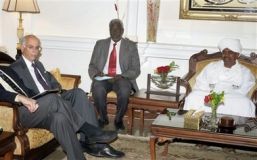Sudanese president gets brief response from US Bush
By Glenn Kessler*
March 8, 2007 (WASHINGTON) — Sudan’s president, Lt. Gen. Omar Hassan al-Bashir, last month wrote Bush a lengthy private letter about the situation in Darfur, where as many as 450,000 people have died in a campaign that the United States has labeled genocide. Bashir’s letter, which was not previously disclosed, was described by U.S. officials who read it as an extremely well-written whine about U.S. pressure on Sudan to expand an undermanned African Union force into a much larger force including U.N. peacekeepers.
 Bashir argued that he was implementing a deal to expand the force as fast as he could. He argued that U.S. pressure tactics will not work and are aimed at the wrong problem. Instead, he said, the problem rests with the rebels in Darfur.
Bashir argued that he was implementing a deal to expand the force as fast as he could. He argued that U.S. pressure tactics will not work and are aimed at the wrong problem. Instead, he said, the problem rests with the rebels in Darfur.
“His message was that he has agreed and things are moving forward,” a senior administration official said. “We don’t see things that way.”
Originally, officials said, Bush’s top foreign-policy advisers decided that the president should not respond to Bashir’s letter. This was the second letter Bashir had sent in the past year, and the earlier one was not answered. Some officials believed that letters between leaders are not effective diplomacy — and others thought it was not appropriate to respond to Bashir’s missive. A letter might be seen in some circles as appeasement.
Bashir is widely viewed in the administration as one of the main roadblocks to ending the suffering in Darfur. The conflict broke out in 2003, when African rebel groups attacked police stations and military outposts, and then the Arab government responded by supporting a militia — known as the Janjaweed — in an effort to crush the rebellion. About 2,000 villages have been destroyed across Darfur, leaving 2.5 million homeless and herded into often dangerous refugee camps.
“The Sudanese government and government-backed janjaweed militia bear responsibility for the genocide in Darfur, and all parties to the conflagration committed serious abuses, including the widespread killing of civilians, rape as a tool of war, systematic torture, robbery, and recruitment of child soldiers,” the State Department said Tuesday in its annual human rights report.
When Iranian President Mahmoud Ahmadinejad wrote Bush a rambling, 18-page letter last year, the Iranian presidential Web site proudly displayed it, translated into several languages. The site even included a photo display of Ahmadinejad writing the letter and Bush reading some sort of document, which the Web site suggested was the Iranian letter. Despite the fanfare, Bush never answered Ahmadinejad’s correspondence.
But last week U.S. officials decided that Bush should respond to Bashir.
Andrew Natsios, the president’s special envoy to Sudan, was headed to Khartoum and planned to meet with Bashir. U.S. officials have been finalizing the details of “Plan B” — a long-threatened package of general financial sanctions, targeted sanctions on a list of individuals and even a possible “no-fly” zone over Darfur if Sudan does not comply with international demands. Officials concluded that a personal letter from Bush would allow Natsios to open a conversation with Bashir on how to speed up the process of allowing the new peacekeeping force.
Natsios met with Bashir yesterday, including a rare one-on-one session that lasted 20 minutes. He carried a brief letter from Bush, acknowledging Bashir’s recent letter as useful but insisting on “real implementation.” As the senior official put it, “We think that Bashir is one of the pieces that is slowing implementation.”
Officials yesterday had few details on the Natsios-Bashir meeting, but Natsios told reporters in Khartoum after his talks that there was still no agreement on allowing United Nations troops to assist the faltering African Union effort. The A.U. announced yesterday that two of its peacekeepers had been killed and a third seriously wounded by a rebel group that had signed a peace agreement last year.
Natsios accused the Sudanese government of harassing aid workers. “The government has constructed a very onerous set of bureaucratic requirements which are essentially paralyzing the relief effort,” he said.
(Washington Post)
